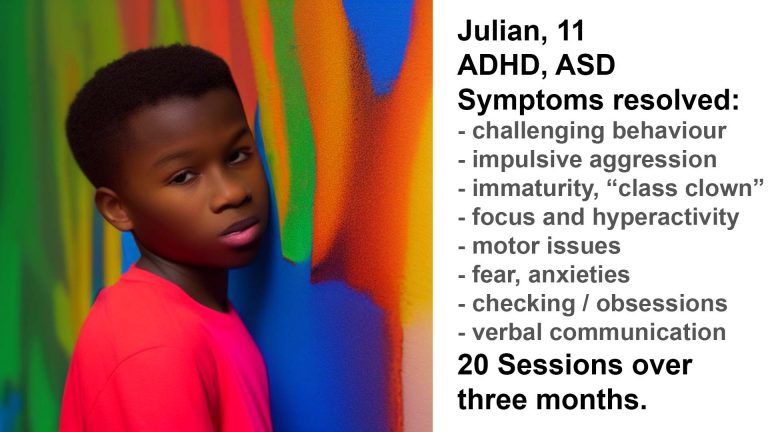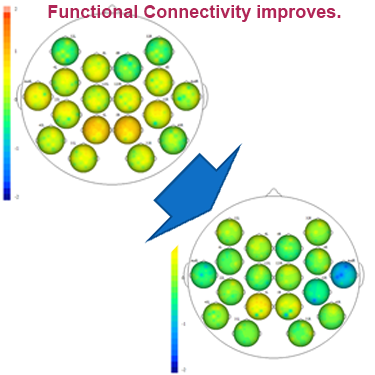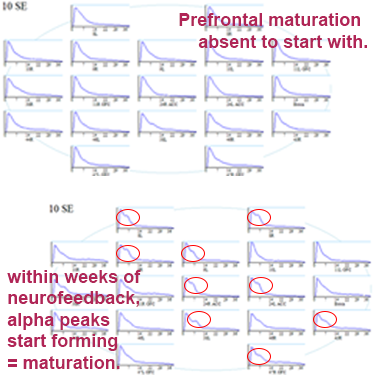Case Study: Julian, 11, ADHD, suspected ASD

Behaviour Issues resolved in Five Sessions; Accelerated Maturation
Before
– challenging behaviour, tantrums
– impulsive aggression, especially when unexpected outcomes
– overall immaturity
– attention seeking, “class clown”
– focus issues and hyperactivity
– motor and coordination issues
– checking behaviour, obsessions, inflexibility
– fear, anxieties
– verbal communication, at times talking “jibberish”
20 Sessions over three Months
After
– behaviour and aggression resolved within five sessions
– improved flexibility
– calmer, focussed, able to plan
– physical coordination, gait and fine motor skills normal
– self-confident and engaged
– verbal communication structured, purposeful, refined
– parents delighted
Julian's Full Story:
Julian, just turned 11, introduced himself with “I’m Julian. I have ADHD”. His self-esteem was on the floor.
Shy and well-behaved, his demeanour contrasted with the behaviour issues his mother deemed most pressing. Her altercations with Julian were daily, prompted by incidences where things didn’t go as imagined or hoped for by him, and turning into a self-fuelling rage that would spoil the entire weekend. His focus was poor, conversations marred by distractions (“jibberish”, in her words), relative maturity low for his age group and he fortunately attended a school that catered for his academic performance and social needs.
A year of psychotherapy almost landed him with an autism assessment, and he hated the various other therapeutic procedures he had to endure that aimed at helping his physical coordination issues.
Within two weeks, or four sessions, his behaviour had taken a turn; in his mother’s words:
“I wanted to mention that we have noticed improvement with Julian.
He is calmer, less reactive and when he gets frustrated he manages to calm himself down.
Not sure if it’s a temporary thing, but this weekend was all right :)”
Far from temporary, his maturation accelerated noticeably in the following weeks.
A family trip was described as “the best vacation we’ve ever had!” by his mother. While on holiday, he learned to scuba dive, and his parents noticed that he was asking coherent, thoughtful and relevant questions during the instruction. Anxieties and fears dropped noticeably, attention and focus improved, childish behaviour – such as “class clown” attempts at drawing attention – ceased, and he became involved in extracurricular school activities.
Julian’s brain maps confirmed the transition he was going through. He had skipped years of physical maturation that should have taken place, especially in his prefrontal cortex. Functional connectivity of brain areas responsible for behaviour, focus and sense of self had improved substantially, as – notably – had his motor skills. Julian’s trajectory has changed from spiralling into lower depths of special needs diagnoses, to establishing a confident, engaged and healthy risk-taking personality. With these new acquired powers, he is able to shape his own future in a way that helps sustain his progress.
Does it last? Yes. A year later Julian is thriving at school and socially.
We all evolve, and life throws us challenges. Key to improvement is being equipped with the right tools – cortical maturity and functional connectivity in this case – that help us create positive feedback loops within our environment.
Twenty sessions helped liberate this young man immensely. With neurofeedback training we can address developmental issues, non-invasively, in a short time to produce transformational results.

